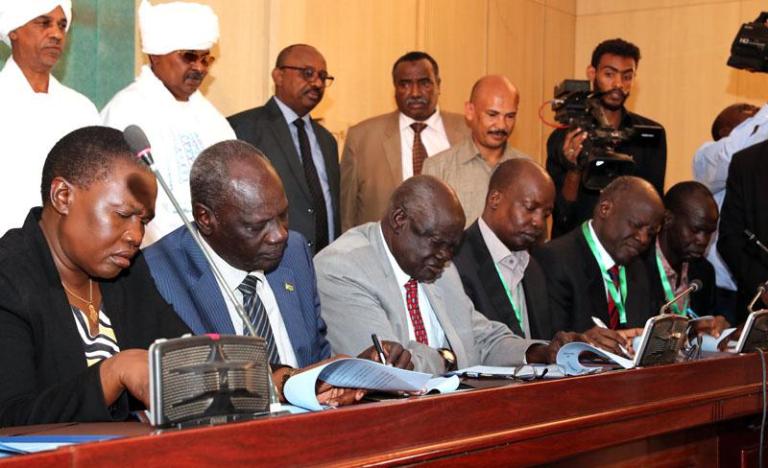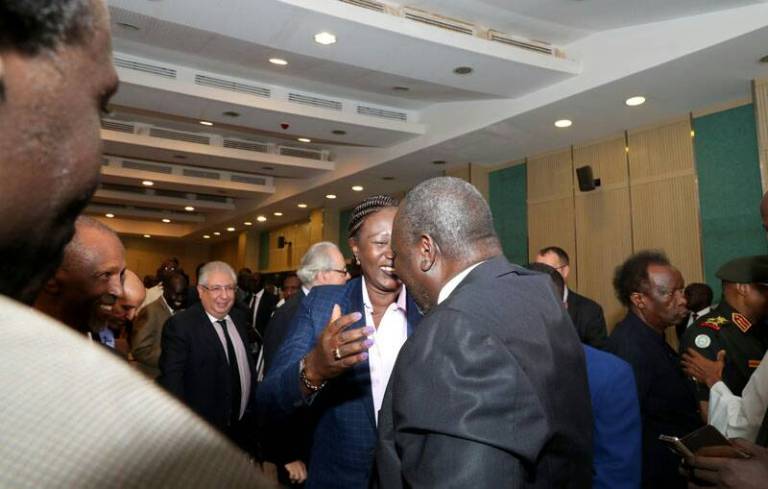South Sudan’s parties sign security arrangements agreement

July 6, 2018 (KHARTOUM) – South Sudanese government and armed opposition groups parties Friday signed an agreement on the outstanding issues of the security arrangements paving the way for a proper implementation of permanent ceasefire agreement they enforced since the first July.
The deal includes the permanent ceasefire, the pre-transitional period measures, the transitional and period mechanism of security arrangements.
The parties have reached the deal since Wednesday. However, on Thursday the Sudanese army spokesperson said it would be signed in presence of President Omer al-Bashir who was in Djibouti.
But finally, the media houses on Friday were informed that the signing ceremony would take place at the headquarters of Sudan Armed Forces in Khartoum, in presence of the Sudanese mediation team including Defence Minister, Director of National Intelligence and Security Services, the Director General of the Sudanese Police Force, and the head of Sudanese military intelligence.
“The Parties hereby agree that the Permanent Ceasefire signed in the Khartoum Declaration of 27 June 2018, which came into effect on 1st July 2018, shall be observed meticulously throughout the Republic of South Sudan,” reads the agreement seen by Sudan Tribune.
The deal further provides that prisoners of war (POWs) and detainees shall be released immediately, guarantees free movement of people and commodities and orders to open humanitarian access.
The agreement was signed by the Information Minister Michael Akuei Lueth, Mrs Angelina Teny, head of the SPLM-IO national committee for security and defence, Gabriel Changson Chang head of the South Sudanese opposition alliance, Lam Akol Chairman of the National Democratic Movement and others.
The ceremony was also attended by the IGAD Special Envoy for South Sudan and foreign diplomats in Khartoum.
Sudanese Defence minister Awad Ibn Ouf who chaired the mediation team congratulated the South Sudanese parties for the efforts done to achieve the deal and expressed hope that all the parties join hand to implement the peace agreement.
Foreign minister El-Dirdeiry Ahmed said that Sudan and Uganda will follow up the implementation of this agreement on the ground so that South Sudanese enjoy peace, security and stability.

During their meetings in Addis Ababa, the parties failed to reach a consensus on the determination of demilitarized areas, forces’ cantonment modalities, the number of parties’ representatives in the Joint Transitional Security Committee and the timeframe for the unification of forces.
The deal provides to form a joint military ceasefire commission at national, states’, counties and payams level.
Also, it orders to demilitarize all the civilian areas, disengagement, separation of forces and collection of long and medium range heavy weapons. The demilitarized areas include schools, service centres, occupied houses, IDPs camps, protection of civilians sites, villages, churches, mosques, ritual centres and livelihood areas.
Troops will be cantoned under the control of the current monitoring teams at their present barracks and sites. However cantoned forces shall be assembled in a size of not less than a battalion, the deal indicates.
Regarding the Joint Transitional Security Committee, the agreement says eight of its members (the half) will be from the government and the other half from the opposition groups, the SPLM-IO (5) and (3) from the South Sudanese Opposition Alliance.
For the timeframe, the agreement reads that “Notwithstanding any agreement to the contrary, the Transitional Period of (36) thirty-six months shall start on completion if redeployment of necessary unified forces, or on the expiry of eight (8) months whichever takes place first.”
The deal is seen as a key step in the implementation of the 2015 peace agreement especially after the clashes of July 2016 that stopped its implementation.
Now the parties have to settle three other outstanding issues in the governance chapter and to convince President Salva Kiir to remove his veto against the participation of Riek Machar in the transitional government.
(ST)
Click here for the full text of the security arrangements agreement
